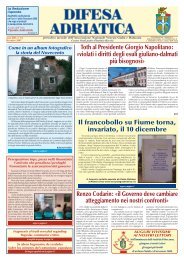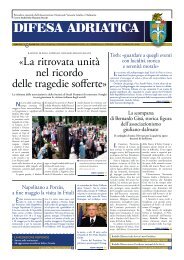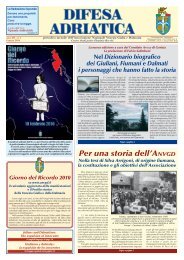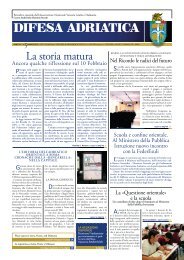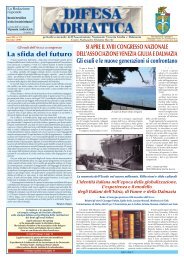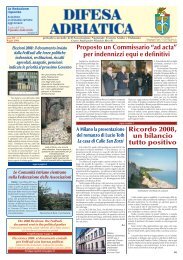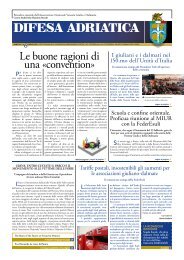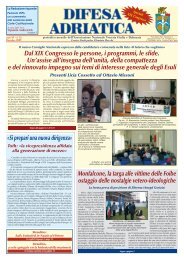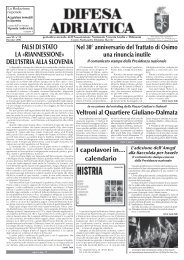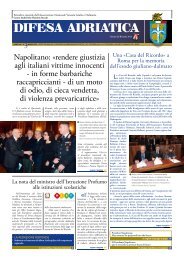14 DIFESA ADRIATICA Aprile 2008February <strong>10</strong>th: WidespreadParticipation in Italyand Throughout the WorldThe February <strong>10</strong> th Day of Remembrancewas celebrated in 260 differentp<strong>la</strong>ces, in Italy and worldwide, withceremonies ranging from the p<strong>la</strong>cementof commemorative wreaths tostreet naming, shows and concerts. Astrong witnessing of solidarity, and willto understand our history, as well asthe desire to participate in events thatopen the way for various kinds ofreflection: the roles of Italy andneighboring countries in these events,and the roles of historians and opinionmakers as well.Italian president Giorgio Napolitano’sspeech was a great satisfactionfor us, as it showed that the lessons ofhistory have been wi<strong>del</strong>y learned, atleast to a certain extent. From thePresident’s speech, which was partiallyrepeated from <strong>la</strong>st year’s, it is time forus to reflect on what was done this year,in Italy and among our immigrantcommunities throughout the world.Oftentimes, problems that havegone unexpressed, and tensionsaccumu<strong>la</strong>ted through the years, find avent in the debate surroundingFebruary <strong>10</strong> th , which becomes a fontof emotional cleansing and a base fordiscussing themes, and not only aboutour Exodus, that were kept in silencefor too long.The events surrounding our Exodusbecome part of a much <strong>la</strong>rger discussionon the movement of popu<strong>la</strong>tionswithin Europe before and during theSecond World War. This is why, in this“vast sea”, considerations made arenever simplistic: they need intelligentfilters and a positive approach if onewishes to convert the sufferings of anentire people into energy capable ofbuilding new re<strong>la</strong>tionships andpacification. When we state that wewant to return to our home<strong>la</strong>nd, whenwe affirm that our goal is to allow ourhome<strong>la</strong>nd’s Italian culture to beabsorbed by the people who now livethere, we are not speaking of settingup an occupation: we are merelydoing our part to assure that a richhistory becomes part of the treasure ofthe world. I believe that this is a noblep<strong>la</strong>n which gives dignity to the present,and allows us to hope for a kind ofjustice that goes above and beyond,while always understanding, theinjustices of confiscated properties.• • •With the Day of Remembrance,our commitment has become important.The implosive force that characterizedour associations’ activities fora long time has now come out intothe open, and projects itself towardnew, finally credible, scenarios. This isall possible due to the ample participationin this year’s events throughoutItaly. In the first few years, the centraltheme of this Day was prevalent: inone city only, we brought together thehighest authorities and most importantceremonies.Then something unexpected,profound, and, in some ways, satisfying,happened: the whole of Italyresponded, and chose to be by theExiles’ side in this moment.Why?When the Istrian, Dalmatian andFiume Exile occurred, the 350,000Italians were scattered among 130refugee camps situated throughoutItaly. An entire popu<strong>la</strong>tion found itselfin the position of having to interact withspecific local situations, sometimesrevealing their origins, sometimeshiding them, not so much out ofshame, but because of the uncomfortablesituation brought about by theattitude toward them in Italian politicalcircles. In any case, the Exiles allowedthemselves to be recognized, enteringinto local life and making their markin civil society. We must consider thiscurrent outpouring a homage to thesepeople who brought to Italy and theworld the principles of an evolvedsociety, committed to work, tied to itsChurch and to the values of a longhistory of contact with its surroundingworld.• • •In Trieste, the moral capital of theExodus, it was almost a given that Dayof Remembrance events would bewidespread. It was less expected incities such as Venice or Bologna, wherein the past Exiles had been a source ofargument and refusal. Even so, <strong>la</strong>styear, with a special p<strong>la</strong>que dedicatedat the Bologna train station, wemanaged to begin an importantchapter in our re<strong>la</strong>tionship with publicopinion.This year, in the Emilia-Romagnaregion, nearly every city participatedin remembering in different ways.Schools made requests for educationalmaterial, textbooks on the history ofthe Exile and the Foibe, and documentaries.We feel that we are on theright path. To be sure, there is no <strong>la</strong>ckof contradictions. There are those who,taking advantage of the focus on theseissues, want to advance their theoriesof negation. Our hope is that the publicwill realize the difference betweenfacts and partial opinions. History isnever b<strong>la</strong>ck and white, and thereforewe invite everyone to reflect on theinformation they hear from those whoare against the cause of this dispersedpeople, and above all we invite peopleto be informed, to seek out information:in the past few years, vastamounts of information have beenwritten and published, by serioushistorians who, while not holding amonopoly on the truth, come veryclose indeed.In Slovenia and Croatia, newspapersgive very negative accounts onthe Day of Remembrance, as if this Daywere “against” something, and this issimply not true.The Exiles want to speak out abouttheir history, not to make accusations,but rather for a just recognition of thefacts and events that struck a people,in a Europe which today is finally openwithout reserve to these reflections. Inthe rest of the world, too, there are localcommittees of Giuliani and Dalmatianswho have taken this Day andtransformed it into one of greatrecognition by the communities inwhich they now live.Personally it gives a sense of greatsatisfaction.Now, a <strong>la</strong>w is needed that ratifies,finally, equal and definitive compensationfor the Exiles. There needsto be an agreement with Slovenia andCroatia for giving back those propertieswhich are still avai<strong>la</strong>ble.It is sure that recent disagreementsmay slow our pace, but they also helpus to focus on the still unsolvedproblems that we need to work on;they help us, also, in insisting that “thetruths” – because that is what they are– triumph over the conditionings of thepast.Renzo CodarinPresident of the Federationof the Associations of ExilesDay of Remembrance:Some Messages Receivedat ANVGD HeadquartersWe offer our readers some of themessages that we received on theoccasion of the February <strong>10</strong> th Day ofRemembrance of the Exile of the Italianpopu<strong>la</strong>tion from Venezia-Giulia andDalmatia, and of the Foibe.In his welcoming speech, FrancoMarini, the President of the ItalianSenate, underlines how “at a distanceof many years, the pain is still alive forthe tragic destiny of those unarmedcitizens who paid their being Italianwith their own lives”. On the meaningsof the Day of Remembrance, he addsthat it “contributes to keeping alive thememory of many Italians and theiruntold suffering that was kept quiet forsuch a long time”.The President of the House ofDeputies, Fausto Bertinotti, reminds ushow “the story of the Giuliani andDalmatian exiles – one of the mostdramatic stories in our recent history –marked the tormented story of ourEastern border, through a long sequenceof tragic events in which the c<strong>la</strong>sh ofideologies was united with ethnicintolerance, and the horrors of war wereunited with the follies of the totalitarianisms.”Discussing the modernrelevance of an historic theme, Bertinottiaffirms that “today the memoryof the scorned dignity of our fellowItalians has its p<strong>la</strong>ce in full in thecommon treasure of facts, values andprinciples which allows all Italian womenand men to recognize themselveswithin the same community”.The Premier, Romano Prodi, intendedto underline some thoughts thatcome to mind in marking the Day ofRemembrance, namely that “we mustnot forget, but rather we must cultivatethe seeds of democracy and freedomin the respect of universal rights” .The inauguration of the Monumentin Rome furnished the occasion formany key exponents of political andmilitary spheres to send meaningfulmessages to the Committee and itspresident, Oliviero Zoia. Among these,Vannino Chiti, Minister for ParliamentaryTies and Institutional Reformwrote that “the act of erecting amonument is one of respect due to thethousands of victims of those terriblepersecutions kept silent for too long. Itrepresents the end of the ‘conspiracyof silence’ and the commitment of allpeople so that simi<strong>la</strong>r horrors are notrepeated. My wish for the exiles is thatthey can bring their extraordinaryeconomic, social and cultural fiber toa modern ot Europe, in which beingItalian is an essential component”.The Minister for Rights and EqualOpportunities, Barbara Pol<strong>la</strong>strini: “Theinstitution of the Day of Remembranceis a necessary act of civility, which theentire country can recognize. The entirecountry can unite in an equal condemnationof those atrocious facts asone of the darkest pages of our nation’shistory. I believe, though, that Memory,that Remembrance, cannot be confinedsolely to the evoking of mourning andtragedies.They have a sense only if theybecome the spark that ignites possibleredemption. Remembering is not onlyan act of duty. It means a renewal ofthe path towards the full affirmation ofthe dignity of the human being, while,at the same time, guiding everyindividual toward making the most ofhim or herself” .Franco Danieli, the Vice-Minister forForeign Affairs “I am pleased to sendyou my sincere esteem for the activitiesthat your Association carries out withseriousness and commitment in representingour fellow Italians forced to fleeVenezia-Giulia and Dalmatia and theend of the Second World Conflict. Moregenerally, I feel pressed to express myheartfelt closeness to all those who striveto keep alive and diffuse the memoryof the sacrifice of all the victims of thefoibe and the exodus. Those eventsrepresent one of the darkest momentsin the recent history of Europe. I believethat an adequate knowledge of historyis vital in order to avoid the repetitionof simi<strong>la</strong>r atrocities, and that thecommitment of individuals and institutionsis necessary to ensure the respectfor human digniry and life in any andall circumstances” .The Undersecretary for InternalAffairs of State, Ettore Rosato: “To theauthorities, the Associations, and mostof all to the Exiles present, I send myheartfelt participation in the event thattoday is being commemorated withrightful solemnity. The Monumentwhich, from now on, will serve as aconstant reminder of the Foibe Victimsrepresents, only just adequately, thesentiment of pity due to the Innocentswho, in the cavities in the earth, werehurled toward their untimely andiniquitous destiny. Whenever ourRepublic, together with Regional andlocal representatives, brings about sucha moral compensation towards its own,it is right to rejoice”.Senator Francesco Cossiga wantedto express his “affectionate closeness”to the family of foibe victims. “On thissubject,” he noted, “I am g<strong>la</strong>d to call tomind that as President of Italy, I was thefirst president to render homage at theBasovizza Foiba. On this Day ofRemembrance, I wish moreover toadhere to the initiatives promoted bythe Association to preserve and renewthe memory of those tragic eventsRome, February <strong>10</strong>th, 2008. Part of the solemn inauguration of themonument dedicated to the Foibe victims, which took p<strong>la</strong>ce with majorcivilian and military authorities in attendance, along with a strongrepresentation of exiles from Rome and the surrounding areaswhich caused the exodus of theGiuliani, Fiumani and Dalmatians,towards whom the heartfelt thoughtsof all Italians spring forth”.The President of the Region of Lazio,Piero Marrazzo, cited the words ofPresident Napolitano, who describedas “<strong>la</strong>te in coming” the memorial of thetragedy. He added that “memorycannot continue to be politicallypartisan. No dictatorship can bejustified, because on the other side ofthat dictatorship there are the dead” .Marrazzo stressed that, among theunsolved problems of the exiles, thereremains the matter of incorrect p<strong>la</strong>ceof birth on documents.This offends their consciousness asItalians. He then went on to emphasizethe pain of these Italians, and also ofthe Jewish communities “becausegoodness is kept where there are peoplewilling to defend it, and the experienceof pain can be shared but it lingers inthose who have suffered, while memorymust be shared in common and cannotbe restricted and confined within thefamily.” He concluded that “if therehadn’t been for the exiles who fled those<strong>la</strong>nds, we would not have a collectivememory today. Those who have enteredinto those exile families know this,having listened to their story and heardabout their experiences.The government institutions havethe duty of keeping the communitytogether, and the monument that hasbeen inaugurated, besides uniting us,must let us remember and recognizethose fallen as martyrs of our identityas a strong, living and compact nation”.From the highestMilitary AuthoritiesThe Head of the General Staff ofthe Italian Navy, Squadron Admiral PaoloLa Rosa: “On this occasion I wishto express the closeness and solidarityof the entire Navy as well as my own.‘Memory’ feeds the values at the baseof our society, and builds inestimabletreasure to be passed on to the futuregenerations.On the Day of Remembrance, theimages of the tragedies experienced bythe Italian martyrs of the foibe and thoseforced into exile will be rendered allthe more vivid thanks to this monumentdedicated to them. I wish to express tothe Association the appreciation of theentire Navy for its strong commitmentin preserving and renewing the memoryof those tragic events whch haveentered into our shared nationalheritage” .The Chief Commander of theFinancial Guard, General CosimoD’Arrigo: “I wish to express, on my ownbehalf and on that of the FinancialGuard, the highest admiration for theconstant and profuse commitmentcarried out by the volunteers of theANVGD to keep memory alive of themany Italians who, at the end of WorldWar Two, went through terrible turmoi<strong>la</strong>nd suffering, to the point of horribledeath in the foibe.As I bow symbolically in front ofthe monument dedicated to the IstrianFoibe victims, I send a heartfelt thoughtto the many innocent victims, and tothe family members of those who wereso savagely killed or forced to leave theirhouses, towns and cities.And I feel that it is right, today, toremember the many Financial Guardsmenwhose blood was shed in thisdark period of our national history, andto honor those among them whosecruel destiny was to die in the foibe,guilty only of being Italians, of servingItaly, often after having courageouslydefended the local popu<strong>la</strong>tion fromraids, vendettas, and abuses of everykind.Red.(traduzioni di Lorie Bal<strong>la</strong>rin)
Aprile 2008<strong>10</strong> de Febrero:<strong>la</strong> participación al unísonode Italia y <strong>del</strong> mundoSon 260 <strong>la</strong>s localidades de Italia y<strong>del</strong> mundo que han participado con unaceremonia – con contenidos diversificadosdesde <strong>la</strong> puesta de coronas, alnombramiento de calles, desde losespectáculos a los conciertos – al Día<strong>del</strong> Recuerdo. Un testimonio fuerte desolidaridad, de voluntad de entendernuestra historia y de todas maneras departicipar en un acontecimiento queabre tantos puntos de reflexión. Seasobre el papel de Italia como <strong>del</strong> de losPaíses cercanos involucrados en lospercances, pero también sobre el dehistoriadores y críticos.Las pa<strong>la</strong>bras <strong>del</strong> Presidente de <strong>la</strong>República Giorgio Napolitano nos handado una grande satisfacción porquedemuestran que <strong>la</strong> lección de <strong>la</strong> historiaha sido aprendida un poco por todos ycomenzando por <strong>la</strong> intervención <strong>del</strong>Quirinale, retomado en parte de <strong>la</strong> de<strong>la</strong>ño pasado, tenemos que pararnos areflexionar sobre lo que también este añose ha hecho en Italia y en el mundodonde nuestros coterráneos viven.A menudo problemas no expresados,tensiones acumu<strong>la</strong>das en eltranscurso de los años, se disipan justoen el debate sobre el <strong>10</strong> Febrero que sedemuestra, en cierto modo catártico, yverifica temáticas que han estadodemasiado tiempo silenciadas ennuestra historia y no sólo en <strong>la</strong> nuestra.La odisea de los Desterrados se convierteasí en parte <strong>del</strong> debate sobre el movimientode pueblos que ha afectado Europaantes y durante <strong>la</strong> segunda guerramundial. Esto es por lo que en este “margrande” <strong>la</strong>s consideraciones nunca sonsimplistas, tienen necesidad de filtrosinteligentes y de un acercamiento positivosi se quiere transformar el sufrimientode pueblos enteros en energía capaz deconstruir nuevas re<strong>la</strong>ciones y realidadespacificadas. Cuando decimos quequeremos volver a nuestras tierras,cuando afirmamos que nuestra meta eshacer que <strong>la</strong> cultura italiana de nuestrastierras este hecha por <strong>la</strong> gente que viveen el<strong>la</strong>s, no queremos poner en marchauna ocupación sino dar nuestra contribuciónpara que una historia ricallegue a ser patrimonio <strong>del</strong> mundo. Creoque esto es un mo<strong>del</strong>o alto que dadignidad al presente y nos permiteesperar todavía una justicia que traspase– aunque los comprenda – los problemasde indemnizaciones y bienes abandonados.• • •Con el Día <strong>del</strong> Recuerdo, nuestra<strong>la</strong>bor se ha vuelto importante. La fuerzaimplosiva que ha caracterizado <strong>la</strong>actividad de nuestras asociaciones durantetanto tiempo, sale al descubierto yse proyecta hacia nuevos, finalmentecreíbles, escenarios. Todo esto ha hechoposible <strong>la</strong> participación al unísono deItalia a esta manifestación.Los primeros años, se quería dar unacentralidad al Día <strong>del</strong> Recuerdo,focalizando en una ciudad <strong>la</strong>s presenciasmás cualificadas, <strong>la</strong>s ceremonias másimportantes. Después ha sucedido algoinesperado, profundo, en cierto modosatisfaciente. Italia entera ha respondido,ha elegido estar al <strong>la</strong>do de los Desterradosen este momento.¿Por qué?Cuando se dio el éxodo de Istria, Fiumey Dalmazia – los 350.000 italianosfueron destinados a casi 130 campos deprófugos esparcidos por toda Italia. Unentero pueblo se ha encontrado con tenerque interactuar con <strong>la</strong>s realidadeslocales, a veces reve<strong>la</strong>ndo <strong>la</strong> propiaproveniencia, otras veces encubriendo<strong>la</strong> que para muchos era considerada nouna vergüenza pero si una situaciónincómoda visto el comportamiento de<strong>la</strong> política italiana de cara a ellos. Losdesterrados, de todas maneras, se handado a conocer, entrando en los porosde <strong>la</strong> sociedad civil, dejando <strong>la</strong> huel<strong>la</strong>.Consideramos <strong>la</strong> respuesta al unísonoun homenaje a <strong>la</strong> relevancia de estaspersonas que han traído a Italia y almundo los principios de una sociedadevolucionada, dedicada al trabajo, unidaa su iglesia y a los valores de una <strong>la</strong>rgahistoria de contactos con el mundocircunstante.• • •En Trieste, capital moral <strong>del</strong> éxodo,<strong>la</strong>s manifestaciones son casi obvias,menos en localidades como Venecia oBolonia donde los desterrados han sidoobjeto de disputa y rechazo. Pues bien,el año pasado, propio con el letreroapostado en <strong>la</strong> estación de Bolonia,hemos conseguido abrir un capituloimportante en nuestra re<strong>la</strong>ción con <strong>la</strong>opinión pública. Este año en <strong>la</strong> regiónemilio-romagno<strong>la</strong> casi todas <strong>la</strong>s ciudadesse han movilizado para recordarde diversas maneras. De <strong>la</strong>s escue<strong>la</strong>s hanllegado peticiones de material didáctico,de textos sobre <strong>la</strong> historia <strong>del</strong> éxodo y<strong>la</strong>s Foibe, de pelícu<strong>la</strong>s. Creemos que eseste el camino a recorrer. Es verdad queno faltan <strong>la</strong>s contradicciones. Hay quienquiere aprovecharse de este momentopara hacer pasar textos que niegan <strong>la</strong>realidad histórica. La esperanza es que<strong>la</strong> opinión pública consiga distinguir loshechos de <strong>la</strong>s opiniones de partidos. Lahistoria no esta hecha de certezas, deb<strong>la</strong>nco o negro, por lo que <strong>la</strong> invitacióna todos es <strong>la</strong> de reflexionar sobre lo queoyen decir a quien no ama <strong>la</strong> causa deeste pueblo esparcido y sobretodo deinformarse: en los últimos años se haescrito mucho, historiadores serios, queno son depositarios de <strong>la</strong> verdad pero sele acercan mucho.En Eslovenia y Croacia los periódicosdan noticia <strong>del</strong> Día <strong>del</strong> Recuerdo amenudo con tonos negativos, como siel Día <strong>del</strong> Recuerdo fuera una conmemoracióncontra alguien y no es así. Losdesterrados quieren que se hable de suhistoria no para mover acusaciones sinopara tener un justo reconocimiento dehechos que han herido un pueblo enuna Europa que hoy se ha abierto finalmentesin reservas a estas reflexiones. Yademás están, en el resto <strong>del</strong> mundo,los comités giuliano-dalmatas que hansabido transformar esta jornada en unmomento de grande reconocimiento porparte de <strong>la</strong> comunidad en <strong>la</strong> que estáninseridos. Personalmente es una sensaciónde grande satisfacción.Ahora hace falta otra ley que decretefinalmente <strong>la</strong> justa y definitiva indemnizaciónde los desterrados. Hace faltaun acuerdo con Eslovenia y Croacia para<strong>la</strong> restitución de los bienes aún en libredisponibilidad. C<strong>la</strong>ro que <strong>la</strong>s polémicasde estos días nos hacen marcar el pasoy ayudan a poner en el asador losproblemas que aún no se han resueltosobre los que tenemos que trabajar einsistir para que “<strong>la</strong> verdad” – porqueesto es –, al final, acabe lo mejor posiblesobre todos los condicionamientos <strong>del</strong>pasado.Renzo CodarinPresidente de <strong>la</strong> Federaciónde <strong>la</strong>s Asociaciones de los DesterradosRoma, Pa<strong>la</strong>zzo <strong>del</strong> Quirinale,<strong>10</strong> de Febrero 2008.El Jefe de Estadoon. Giorgio Napolitano se dirigea pronunciar su discursoa los familiares de <strong>la</strong>s víctimasde <strong>la</strong>s Foibe como convenidopara <strong>la</strong> solemnecelebración <strong>del</strong> Día <strong>del</strong> Recuerdoy <strong>la</strong> entrega de <strong>la</strong>scondecoraciones en memoria(Foto Presidencia de <strong>la</strong> República)DIFESA ADRIATICADía <strong>del</strong> Recuerdo,algunos mensajesarribados a <strong>la</strong> ANVGDReferimos algunos recortes demensajes arribados a <strong>la</strong> AssociazioneNazionale Venezia Giulia e Dalmaziacon ocasión de <strong>la</strong>s celebraciones <strong>del</strong> <strong>10</strong>de Febrero, Día <strong>del</strong> Recuerdo <strong>del</strong> Éxodode <strong>la</strong> pob<strong>la</strong>ción italiana de VeneciaGiulia y de Dalmazia, y de <strong>la</strong>s Foibe.En su discurso de saludo el Presidente<strong>del</strong> Senado, Franco Marini,subraya como «a distancia de tantosaños todavía está vivo el dolor por <strong>la</strong>trágica suerte tocada a aquellos inermesciudadanos que pagaron con <strong>la</strong> propiavida su ser italianos». Sobre lossignificados <strong>del</strong> Día <strong>del</strong> Recuerdo añadeque «contribuye a tener viva <strong>la</strong> memoriade tantos coterráneos y de susindecibles sufrimientos olvidados durantemucho tiempo».El Presidente de <strong>la</strong> Cámara FaustoBertinotti recuerda como «La odisea <strong>del</strong>os desterrados giuliano-dalmatas – unade <strong>la</strong>s páginas mas dramáticas denuestra historia reciente – ha marcado<strong>la</strong> atormentada historia <strong>del</strong> confínoriental, a través de una <strong>la</strong>rga secuenciade eventos trágicos, en los que el choqueideológico se ha unido a <strong>la</strong> intoleranciaétnica, los horrores de <strong>la</strong> guerra a <strong>la</strong>locura de los totalitarismos». En el traerel tema histórico a <strong>la</strong> actualidad de hoy,Bertinotti afirma que «hoy el recuerdode <strong>la</strong> dignidad humil<strong>la</strong>da de aquelloscompatriotas nuestros forma parte conpleno derecho <strong>del</strong> patrimonio comúnde hechos, de valores y de principiosque consiente a todas <strong>la</strong>s italianas y alos italianos reconocerse parte de unamisma comunidad».El Presidente <strong>del</strong> Consejo saliente,Romano Prodi, ha procurado sinembargo subrayar los temas ofrecidospor el Día <strong>del</strong> Recuerdo, es decir como«no hay que olvidar, sino mas biencultivar <strong>la</strong> semil<strong>la</strong> de <strong>la</strong> democracia yde <strong>la</strong> libertad en el respeto de losderechos universales».La inauguración <strong>del</strong> Monumento enRoma ha proporcionado <strong>la</strong> ocasión adistintos exponentes de <strong>la</strong> política y de<strong>la</strong>s Fuerzas armadas de enviar significativosmensajes al Comité presididopor Olivero Zoia. Entre otros, el ministrode Re<strong>la</strong>ciones con el Par<strong>la</strong>mento y<strong>la</strong>s reformas institucionales, on. VanninoChiti, ha escrito: «<strong>la</strong> edificación <strong>del</strong>Monumento es un acto de respetodebido hacia <strong>la</strong>s miles de víctimas deaquel<strong>la</strong>s terribles persecuciones pordemasiado tiempo silenciadas. Representael final de <strong>la</strong> “conjura <strong>del</strong> silencio”y el compromiso de todos para quehorrores de este tipo no se repitan.Quiero desear [...] a los desterrados [...]el poder traer a nueva vida su extra-ordinariotejido económico, social,cultural [...] en el ámbito de [...] aquel<strong>la</strong>Europa en <strong>la</strong> que <strong>la</strong> italianidad es unade <strong>la</strong>s componentes esenciales»El ministro de Derechos e igualdadde Oportunidades, Barbara Pol<strong>la</strong>strini:«La institución <strong>del</strong> Día <strong>del</strong> Recuerdo hasido un acto de civilidad necesario enel que todo el País se reconoce. Y seune en <strong>la</strong> igual condena de aquelloshechos atroces como una de <strong>la</strong>s páginasmás negras de nuestra historia. […] Creoque <strong>la</strong> Memoria, el Recuerdo, no sepueden extinguir con <strong>la</strong> so<strong>la</strong> evocaciónde los lutos y de <strong>la</strong>s tragedias. Estostienen un sentido sólo si se conviertenen el alma de un rescate posible. […]Recordar por tanto no es solo un actodebido. Es renovar el camino hacia <strong>la</strong>afirmación plena de <strong>la</strong> dignidad de <strong>la</strong>persona humana, guiando al mismotiempo a cada uno a alcanzar <strong>la</strong> partemejor de sí […]».El viceministro de Asuntos Exteriores,Franco Danieli: «Me agradahaceros llegar mi sincero aprecio por <strong>la</strong>actividad que Vuestra Asociacióndesenvuelve con seriedad y tesón pararepresentar a nuestros compatriotashuidos de Istria, Fiume y Dalmazia alfinal <strong>del</strong> segundo conflicto mundial.Más en general me urge expresar mi mássentida cercanía a todos los que trabajanpor tener viva y difundir <strong>la</strong> memoria <strong>del</strong>sacrificio de todas <strong>la</strong>s víctimas de <strong>la</strong>sfoibe y <strong>del</strong> éxodo. […] Aquellosacontecimientos representan uno de losmomentos más oscuros de <strong>la</strong> historiareciente europea. Sostengo que unaadecuada cultura <strong>del</strong> conocimiento yde <strong>la</strong> historia sea indispensable tambiénpara evitar que se repitan símilesatrocidades y que <strong>la</strong> constancia de cadaindividuo y de <strong>la</strong>s instituciones seanecesario para asegurar el respeto de <strong>la</strong>dignidad humana y de <strong>la</strong> vida encualquier circunstancia […]»El subsecretario de Estado deAsuntos Internos, Ettore Rosato: «Hagollegar a <strong>la</strong>s Autoridades, a <strong>la</strong>s asociacionesy sobretodo a los Desterradospresentes, un pensamiento de profundaparticipación al evento que hoy se celebracon justa solemnidad. […] ElMonumento que desde este día enade<strong>la</strong>nte permanecerá para el recuerdode <strong>la</strong>s Víctimas de <strong>la</strong>s Foibe representade manera parcamente adecuada elsentimiento de piedad debido a losInocentes que, en <strong>la</strong>s cavidades de <strong>la</strong>tierra giuliano-dalmata, precipitaron alencuentro de su precoz e inicuo destino.[…] Por consiguiente, cada vez quenuestra República, en armonía conRegiones y Entes locales, <strong>del</strong>ibera ycumple un debido resarcimiento moralde cara a los propios hijos, es justoalegrarse».El sen. Francesco Cossiga, por suparte, ha querido expresar su «afectuosacercanía» a los allegados de losenfoibados. «En re<strong>la</strong>ción – ha replicado– me gusta recordar que como Presidentede <strong>la</strong> República fui el primero enrendir homenaje a los mártires destrozadosen <strong>la</strong>s foibe, a Basovizza. En elDía <strong>del</strong> Recuerdo deseo además adherira <strong>la</strong>s iniciativas oportunamente sugeridaspor esta Asociación para conservary reavivar <strong>la</strong> memoria de los trágicoseventos que causaron el éxodo de sustierras de los istrianos, fiumanos ydalmatas, a los cuales se dirige elconmovido pensamiento de todos lositalianos».El presidente de <strong>la</strong> Región Lazio,Piero Marrazzo, ha citado <strong>la</strong>s pa<strong>la</strong>bras<strong>del</strong> Presidente de <strong>la</strong> República, Giorgio15Napolitano, que ha definido «tardío» elrecuerdo de los sufrimientos y de <strong>la</strong> tragediavivida por <strong>la</strong> comunidad giulianodalmata;ha por tanto añadido que <strong>la</strong>memoria «no puede ser más objeto diuna política de partido. No hay ningunadictadura que pueda ser justificadaporque <strong>la</strong> otra cara de <strong>la</strong>s dictaduras son<strong>la</strong>s personas muertas».Marrazzo ha subrayado, entre losproblemas todavía sin resolver de losDesterrados, el de <strong>la</strong> indicación de loslugares de nacimiento, que en suburocrática injusticia ofenden suconciencia de italianos. Ha querido portanto subrayar el dolor de los istrianos,de los giuliano-dalmatas, y también de<strong>la</strong>s comunidades hebreas «porque elbien alberga donde hay protectores ydefensores <strong>del</strong> bien y el dolor se puedecompartir pero permanece de quien loha sufrido, mientras <strong>la</strong> memoria debeser común y no puede quedarseencerrada en <strong>la</strong> matriz de <strong>la</strong> familia». Haconcluido entonces: «Si no hubieransido los desterrados a huir de aquel<strong>la</strong>stierras hoy no tendríamos esta memoria.Lo sabe quien ha entrado en aquel<strong>la</strong>sfamilias: quien ha escuchado surecuerdo y ha oído palpitar <strong>la</strong>s últimashoras de los caídos. A <strong>la</strong>s institucionescorresponde <strong>la</strong> tarea de guiar y tenerunida <strong>la</strong> comunidad y el monumentoque hemos inaugurado, además deunirnos, debe hacernos recordar yreconocer a aquellos muertos comomártires de nuestra identidad de Paísfuerte, vivo y solidario».De <strong>la</strong>s cumbres militaresEl Jefe de Estado Mayor de <strong>la</strong> Marina,almirante de escuadrón Paolo LaRosa: «En esta ocasión deseo expresar<strong>la</strong> cercanía y <strong>la</strong> solidaridad de toda <strong>la</strong>Marina militar y <strong>la</strong> mía personal. La“memoria” alimenta los valores fundacionalesde nuestra sociedad y constituyeun inconmensurable tesoro quetransmitir a <strong>la</strong>s futuras generaciones.En el Día <strong>del</strong> Recuerdo, <strong>la</strong>s imágenesde <strong>la</strong> tragedia vivida por lositalianos víctimas de <strong>la</strong>s foibe y <strong>del</strong>éxodo de sus tierras, llegarán a sertodavía más vivas gracias al monumentodedicado a el<strong>la</strong>s. […]Deseo expresar a <strong>la</strong> Asociación e<strong>la</strong>precio de toda <strong>la</strong> Marina Militar por elgrande ahínco prodigado en conservary renovar el recuerdo de aquellostrágicos eventos que han pasado a formarparte <strong>del</strong> patrimonio histórico denuestra nación». El ComandanteGeneral de <strong>la</strong> Guardia de Finanza,general <strong>del</strong> Cuerpo de <strong>la</strong> ArmadaCosimo D’Arrigo: «Deseo expresar enmi nombre y en nombre de <strong>la</strong> Guardiade Finanza el sentimiento de <strong>la</strong> más vivaadmiración por el tesón constanteprodigado por los voluntarios de <strong>la</strong> Associazionenazionale Venezia Giulia eDalmazia para que per-manezca viva<strong>la</strong> memoria de los muchos italianos que,inmediatamente después de <strong>la</strong> segundaguerra mundial, soportaron vejacionesy sufrimientos, hasta <strong>la</strong> horrible muerteen <strong>la</strong>s foibe. Al inclinarme simbólicamenteante el Monumento a <strong>la</strong>s Víctimasde <strong>la</strong>s Foibe istrianas, dirijo un conmovidopensamiento a <strong>la</strong>s tantas víctimasinocentes de entonces y <strong>la</strong> cercanía alos familiares de cuantos fueronbárbaramente asesinados u obligadosa dejar <strong>la</strong>s propias casas, los propiospueblos y <strong>la</strong>s propias ciudades.Y sostengo el deber de recordar, hoy,<strong>la</strong> grandísima contribución de sangreofrecida por <strong>la</strong> Guardia de Finanza enaquel oscuro periodo de <strong>la</strong> historianacional y honrar <strong>la</strong> memoria de losmuchos Guardias a los que fue reservadoel atroz destino de <strong>la</strong>s foibe,culpables solo de ser italianos, de servira Italia, frecuente después de haberdefendido con coraje <strong>la</strong> pob<strong>la</strong>ción localde redadas, venganzas y engaños detodo tipo […].Red.(traduzioni di Marta Cobian)



